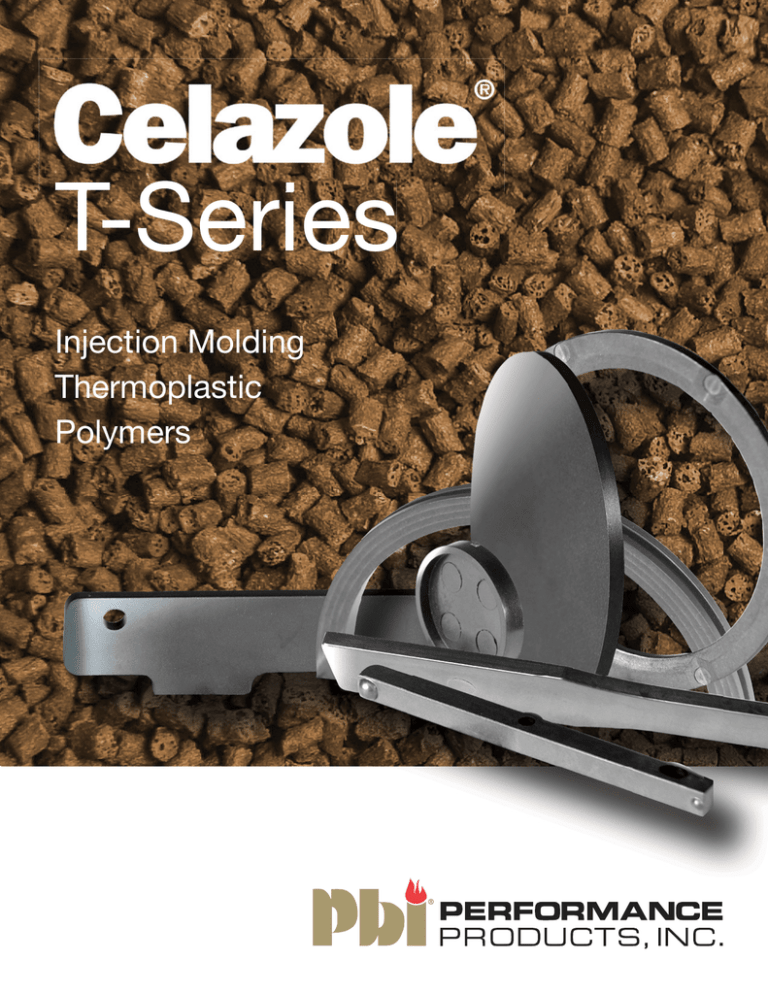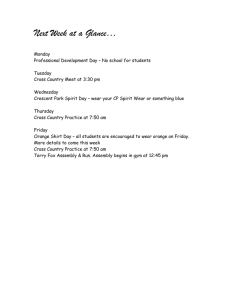
T-Series
Injection Molding
Thermoplastic
Polymers
Celazole® T-Series
Injection Molding Thermoplastic Polymers
TU-60 – Unfilled
• High temperature performance, chemical resistant, V-0 flame rating
TL-60 – Self-lubricating
• Superior wear resistance, low friction and cool running… even under load
TF-60V – Glass fiber reinforced
• Thermal and electrical insulation, low creep, high strength
TF-60C – Carbon fiber reinforced
• Highest strength, very low fatigue; a mechanical workhorse in the heat
Celazole T-Series Applications
• Bearing cages
• Bushings
• Plasma torch tips,
insulators, swirl baffles
• Compressor vanes
• Pump bearings
• Conveyor systems
• Semiconductor wafer transportation
• Dynamic load bearing components
• Sliding surfaces
• Dynamic seals
• Soldering equipment
• Electrical connectors
• Synchronizer rings
• End effector pads
• Temperature sensor housings
• Gears
• Textile equipment
• Glass handling
• Thrust washers
• Metal spinning rollers
• Tilt pad bearings
• Office equipment
• Turbines
• Oil field equipment
• Turbo charger bushings
• Oven conveyors
• Valve seats, stem seals, packings
• Piston rings
• Plane bearings
• Planetary gears
Celazole T-Series Overview
T-Series Explained
T-Series products are composites of Celazole PBI and polyarlyetherketones and come in formulations designed for
some of the most demanding industrial, chemical, petrochemical and semiconductor applications imagined.
At the heart of the T-Series compound is Polybenzimidazole (PBI) – the world’s highest performing thermoplastic;
a highly stable linear heterocyclic polymer known for its exceptionally high (427ºC) glass transition temperature,
high strength, thermal stability and broad chemical resistance. Tractability for injection molding and extrusion is
obtained by compounding the PBI with polyetheretherketone (PEEK). Independently, PEEK is a high performance
thermoplastic with excellent mechanical properties, chemical resistance and thermal stability, but when compounded
with PBI, certain performance advantages of PBI carry through to the composite, while the processability of PEEK
makes the products more functional.
T-Series Value Proposition
The advantage of T-Series over ordinary PEEK is the unexpected property set that results from the combination
with PBI and other fillers (when present) that yield higher heat deflection temperatures (HDT), higher moduli, higher
strength, improved wear resistance and lower creep. In the T-Series composites, HDT’s can be raised to 330ºC, just
below the crystalline melting point of PEEK. The effect can be observed in the accompanying dynamic mechanical
analysis (DMA) chart for TU-60 on this page.
A desirable balance of performance and tractability is obtained with the T-Series products that place the group’s
thermo-mechanical performance above PEEK, but below PBI. T-Series is designed for injection molding of parts that
perform, but are cost effectively produced.
Celazole TU-60 DMA Storage Modulus compared with PEEK and PBI
Storage Modulus (MPa)
10,000
1,000
Celazole U-60
Celazole TU-60
PEEK
100
0
50
100
150
200
250
Temperature (ºC)
300
350
400
450
500
Universal v4.7A TA Instruments
Celazole T-Series is ideal for parts at elevated temperature
Celazole T-Series Products:
Celazole T-Series – Strength vs. Temperature
• Have excellent mechanical properties that
are maintained well above the 143ºC Tg of the
PEEK component
350
Flex Strength (MPa)
300
• Exhibit particularly low strain over time as
compared to polyimide and filled PEEK’s,
even at 300ºC
• Allows users to enjoy improved levels of
equipment performance, weight savings and/or
thinner, smaller profiles
250
200
150
100
50
0
TU-60
TL-60
TF-60V
TF-60C
Celazole T-Series – Modulus vs. Temperature
• Are particularly suited for mechanical
service applications with high load at
elevated temperatures
Flex Modulus (GPa)
25
• Have excellent thermal stability – enabling
metal replacement
• Self-lubricating TL-60 displays low wear rates
under conditions of high pressure (P) and
velocity (V), a high limiting PV and cool operating
temperatures in a lubricant free environment
20
15
10
5
0
TU-60
TL-60
TF-60V
25ºC
TF-60C
260ºC
Comparing DMA Creep Resistance at 300ºC
1.6
3.5
PI
1.4
PEEK+CF30%
Celazole TF-60C
1.0
Strain (%)
Strain (%)
1.2
0.8
0.6
3.0
PI
2.5
Celazole TF-60V
2.0
1.5
0.4
1.0
0.2
0.5
0
PEEK+GF30%
0
0
1
2
3
4
5
6
Time: LOG(sec)
Temperature 300ºC • Load 6.9 MPa
7
8
0
1
2
3
4
5
6
Time: LOG(sec)
Temperature 300ºC • Load 6.9 MPa
7
8
Celazole TL-60 has exceptional tribological performance
Comparative Wear
Between 50 and 100,000 PV, the Wear Factors for
wear grade PEEK were 4.6 times those of TL-60;
wear grade PAI was 2.1 times higher; and wear
grade PI 1.5 times higher than TL-60. The lower
value (e.g. TL-60) is better, as a lower wear factor
means less wear.
Because TL-60 is such a low friction material,
it runs the coolest. That means longer part life.
Between 50,000 and 100,000 PV across the full
range of speeds, TL-60 ran nearly 100F cooler
than wear grade PEEK; 50F cooler than wear
grade PI; and more than 40F cooler than wear
grade PAI.
Wear Factor (in3-min/ft-lb-hr x 10E-10)
50
40
30
20
10
0
50
Figures at right since it was well outside the group of the best 3
materials. Data for PAI does not continue beyond 100,000 PV
because it melted during the 125,000 PV test. For complete
data set and full details download the High PV Wear Study on
www.CelazolePBI.com.
75
100
125
150
175
200
PV (psi-ft/min) in thousands
Average Coefficient of Friction: 50-800 ft/min
.18
.16
.14
.12
.10
.08
.06
.04
.02
0
75
100
125
150
PV (psi-ft/min) in thousands
175
200
Average Counter-Surface Temperature 50-800 ft/min
450
Counter-Surface Temperature (ºF)
Note: The data set for wear grade PEEK is not depicted in the
Celazole TL-60
60
50
TL-60 is both strong and thermal resistant – making
it the ideal choice for high load applications at
moderate and low speeds. In the wear test,
TL-60 was the only material to endure PV’s of
125,000 — 200,000 at the 50 ft/min speed and
loads of 2500 — 4000 psi. The other materials
failed by breaking or melting at these conditions.
PI wear grade
Average Wear Factor: 50-800 ft/min
Coefficient of Friction
In a thrust washer configuration wear test
of competitive engineering plastics used in
tribological applications, Celazole TL-60 proved
itself an exceptional wear grade material. Over
the range of 50 — 800 ft/min, TL-60 exhibited
the lowest wear factors, the lowest coefficients of
friction and the coolest counter-surface running
temperatures in the group including wear grades
of: polyetheretherketone (PEEK), polyamide-imide
(PAI) and polyimide (PI).
PAI wear grade
430
410
390
370
350
330
310
290
270
250
50
75
100
125
150
PV (psi-ft/min) in thousands
175
200
Celazole T-Series Injection Molding Recommendations
Set-up
Recommendation
Machine Temperature Capability
450°C (845°F)
Cylinder & Screw
Abrasion Resistant; HRC hardness 56-60
Injection Pressure
200-250 MPa (26–36 kpsi)
Injection Speed
High speed; up to 400 cm3/sec
Temperature Control
Cartridge heater for molds
Temperature Profile (°C)
TU-60
TF-60C
TF-60V
TL-60
Cylinder Nozzle
430
450
450
450
Cylinder Front
430
450
450
450
Cylinder Middle
420
420
420
420
Cylinder End
380
380
380
380
Mold
200
210
210
210
Equipment Requirement
Injection Speed
Typical
200 cm3/sec or less
Thin parts (.4-.5mm)
400 cm3/sec
Mold Requirements
Mold Surface
Cr Steel; HRC hardness 50-60
Sprue
Taper 2-5 degrees; mirrored face
Pellet Storage/Drying
Storage
Keep dry; use soon after opening
Dry before use
6hr @ 210°C (410°F); -40°C dew point
PBI Performance Products, Inc.
9800-D Southern Pine Boulevard, Charlotte, NC 28273 • 704-554-3378
www.pbiproducts.com
To the best of our knowledge, the information contained herein is accurate. However, PBI Performance Products, Inc. assumes no liability whatsoever for the
accuracy or completeness of the information contained herein. Celazole® is a registered trademark of PBI Performance Products, Inc. © 2013. All rights reserved.




